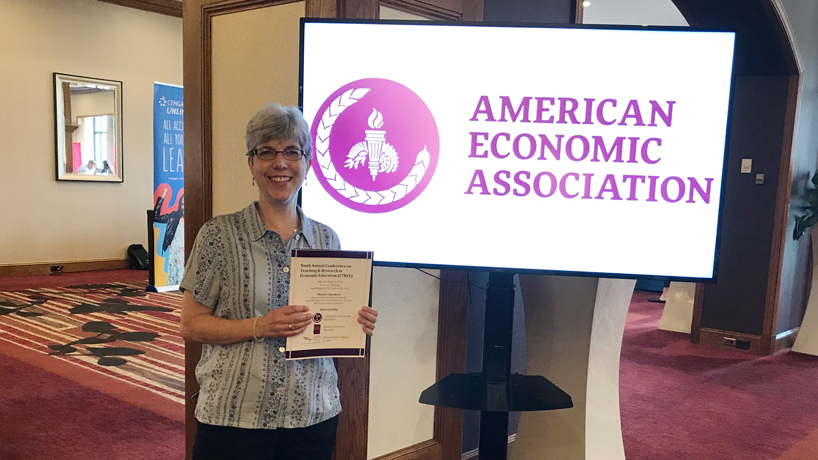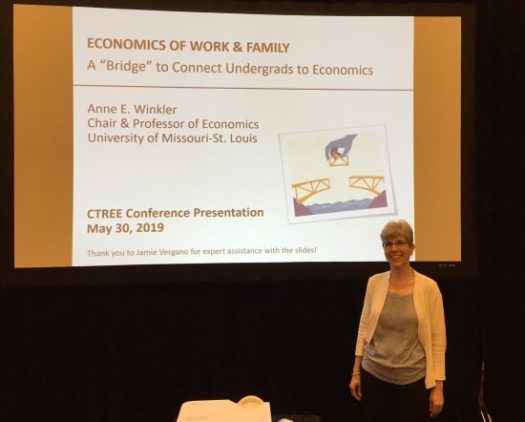
Anne Winkler, chair of UMSL’s Department of Economics, delivered a plenary talk Thursday at the American Economic Association’s annual Conference on Teaching and Research in Economic Education in downtown St. Louis. (submitted photo)
Anne Winkler shares a goal with the American Economic Association’s Committee on Economic Education.
Namely, the chair of the Department of Economics at the University of Missouri–St. Louis wants to see students get excited about economics and aims to encourage them to major in the discipline and work in the field.
Winkler is particularly motivated to help bring more women and underrepresented groups into the profession – something she knows starts with grabbing their attention and piquing their interest in their first principles classes.
“We need to do a better job of helping students see how incredibly interesting and relevant economics is,” Winkler said.
Winkler had a chance to share some of her ideas for how to accomplish that when she delivered a plenary talk Thursday afternoon to an audience of about 200 economic educators at the ninth annual Conference on Teaching and Research in Economic Education. The AEA’s Committee on Economic Education hosts the conference in conjunction with the Journal of Economic Education.
“It was an exciting opportunity for me,” Winkler said of the invitation to speak at the three-day conference being held at the Hyatt Regency St. Louis at the Arch.
Winkler also participated in a pre-conference event Tuesday put on by the Federal Reserve Bank of St. Louis and titled “FRED and Econ Ed at the St. Louis Fed.” She was part of a panel discussion on women in economics moderated by UMSL alumna Mary Suiter, the St. Louis Fed’s assistant vice president and economic education officer.
Winkler had also looked forward to attending several of the sessions of the conference, but her main event was Thursday’s speech.

Anne Winkler spoke to an audience of about 200 economic educators Thursday afternoon at the Hyatt Regency St. Louis at the Arch.
She shared her own expertise on the economics around work and family, which is integral to the 2018 textbook “The Economics of Women, Men, and Work” she co-authored with Cornell University economist Francine Blau. Her talk also referenced knowledge gained from a recent six-year stint as a board member on the AEA’s Committee on the Status of Women in the Economics Profession.
Specifically, Winkler talked about the growing divide in labor force participation and family structures by educational attainment. It’s manifested in marriage, divorce, fertility and the amount of time parents spend with children – outcomes that differ significantly between those with four or more years of college education and those with less than four years of college.
“More highly educated parents spend more time with children, in part because they can,” Winkler said. “They have potentially more flexible schedules. What’s really interesting is that the gap in time spent with children between more highly educated parents and less highly educated parents is not only positive, but it’s growing. That’s something that economists are looking at a lot. It’s another area of growing inequality that I’m not sure that everybody is aware of, but that’s really important in terms of children’s outcomes.”
Beyond sharing the results of some of her research, Winkler wanted to show how topics related to work and family – how much to work, the decision to have children and how to value economic activities done in the household like child care, house cleaning and mowing the lawn – could be brought into the principles of economics classroom. She believes they can be used as a bridge to help students better understand and connect with core economic principles such as opportunity cost.
“It’s a way of making economics come alive, hopefully resonate with students,” Winkler said.
Winkler believes those examples are far more relatable than the widgets professors long ago used and are more relevant for some students than examples pulled from subjects such as sports.
Graduate research assistant Jamie Vergano helped design the slides for Winkler’s presentation.
Winkler would really like to figure out ways to encourage more students like Vergano to pursue economic study. Winkler recently visited eight principles of economics courses to try to deliver a message of why she believes economics is important and rewarding.














